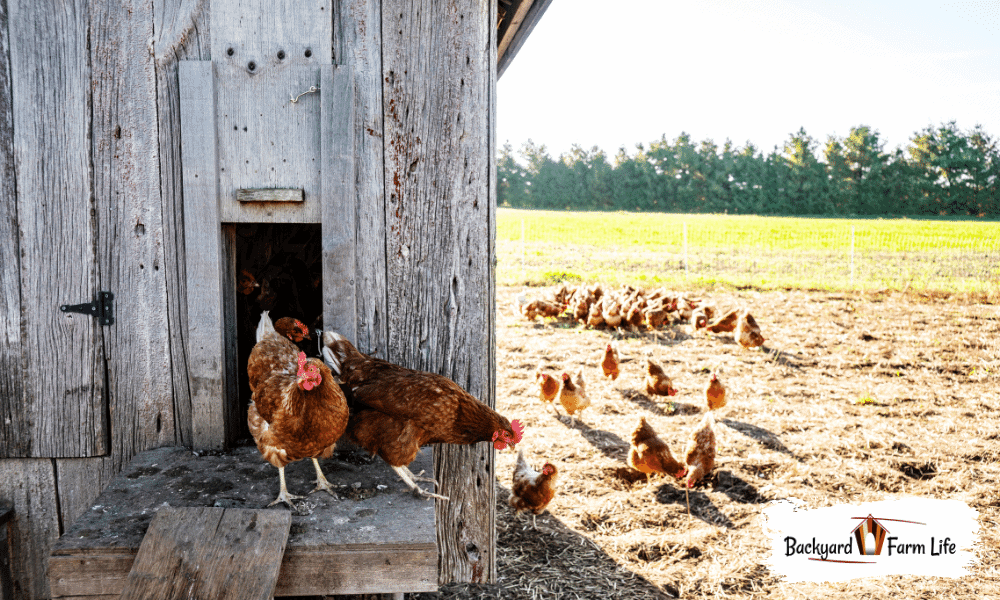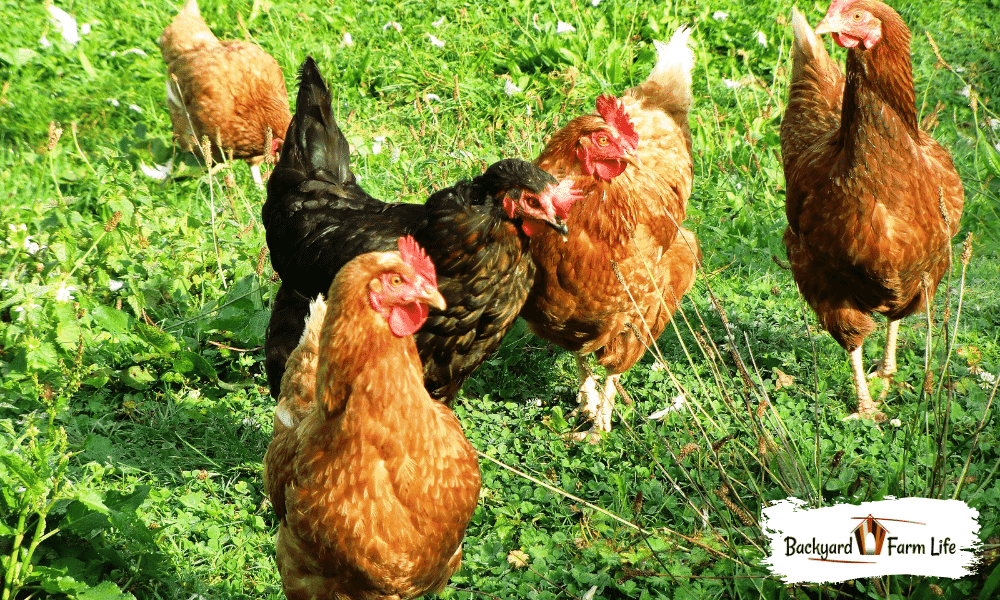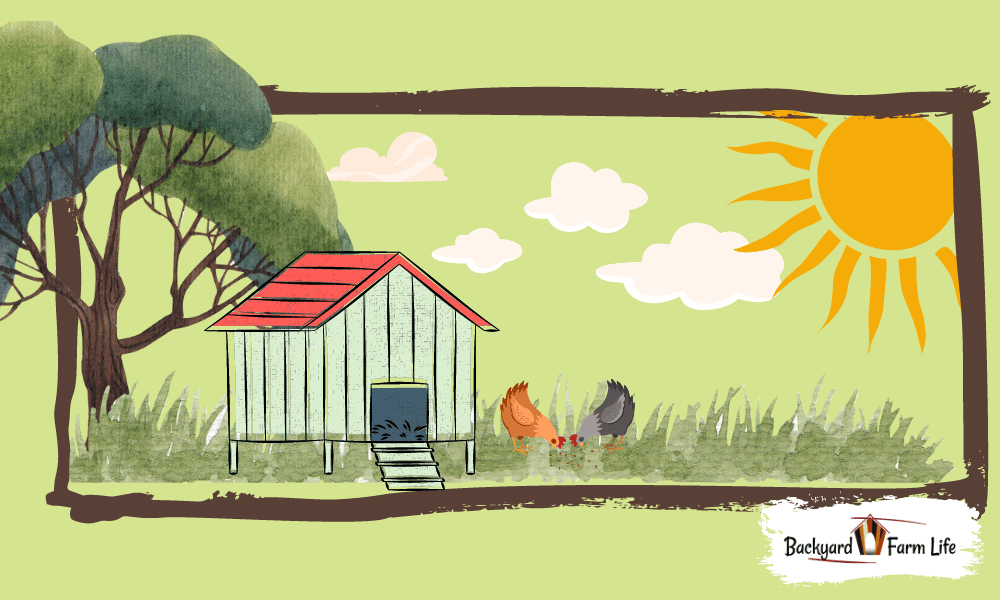The sun has a somewhat complicated relationship with nature. Some animals bask in it, soaking up the heat, others actually require it for energy.
What we do know is that sunlight is essential for life as we know it on earth.
But, too much sunlight can have more detrimental, dehydrating, and overheating effects too!
As chicken owners, we have to ask ourselves: where do chickens sit in the mix?
Well, here’s whether chickens need direct sunlight, the benefits of sunlight for chickens, and whether you should place your coop in the sun or shade!
Contents
Do Chickens Need Direct Sunlight?

We’ve all seen the horrible conditions that some chickens have to endure, exposed in the caged-egg industry. Although these chickens stay alive through artificial light and formulated diets, they are far from thriving.
So, when we talk about chickens needing sunlight, we’re coming from a place of taking true care of our chickens.
From all perspectives, chickens do need direct sunlight – for optimal health, well-being, and egg production.
Sunlight is a chicken’s sole source of natural vitamin D, and the actual light plays a huge part in a hen’s egg-laying cycle. For this reason, chickens should have between 6-8 hours of direct sunlight per day.
All that said, chickens shouldn’t be exposed to direct sunlight more than necessary. Direct sunlight includes potentially harmful UV rays and more easily overheats and dehydrates your chickens, especially in summer.
So, 6-8 hours of direct sunlight every day is more than enough and you should always offer chickens both sun AND shade.
Benefits Of Direct Sunlight For Chickens

Although light certainly plays a part in the egg development cycle of chickens, the benefits of sunlight go far beyond just egg production.
In essence, direct sunlight helps with egg production, hormonal regulation, general health, and the overall well-being of chickens and other poultry.
Egg Production
Studies have confirmed that daylight has a direct impact on egg production.
It’s said that the maximum egg production occurs in 16 hours per day of light, and hens will face problems with egg production with anything less than 12 hours per day of light.
So sunlight stimulates a chicken’s egg-laying cycle. Plus, the Vitamin D in sunlight helps the chickens by facilitating calcium absorption. As we know, calcium is essential for laying hens’ eggshell production.
Overall, direct or indirect sunlight has a positive impact on a chicken’s egg production, no matter the age of your hens! This goes for other poultry too, like ducks.
Direct light can also help young hens start laying or help them lay more consistently.
Vitamin D
Humans need sunshine for vitamin D, and chickens are no different.
Chickens need plenty of sunlight to fulfill their bodies’ need for vitamin D. Vitamin D helps to facilitate several metabolic processes which play a part in strengthening bones and egg-shell development through increasing calcium absorption.
Plus, Vitamin D deficiencies in poultry have been linked to general fragility, with chickens prone to bone fractures, wry necks, weak eggshells, deformities, and the list goes on.
So, the true benefits of vitamin D are felt on both sides. Avoiding vitamin D deficiencies and also assisting in a chicken’s necessary metabolic functions.
Wellbeing
Whether you’re talking about humans or chickens, a lot can be said about the impacts that general wellbeing has on health, immunity, mood, and more.
Just like us, chickens love sunshine. Some chickens will even sunbathe and take naps in the sun!
Sunlight also helps chickens stick to a regular sleep schedule, waking up at first light and putting themselves to bed at dusk.
Without this natural sunlight, a chicken’s sleep habits are thrown off, which can manifest in impacts from decreases in egg production to stress.
So, sunlight is absolutely crucial for a chicken’s overall well-being.
Should A Chicken Coop Be In The Shade Or Sun?

So it’s clear that direct sunlight is both beneficial and essential for a chicken’s health and wellbeing. But does this mean you should put your chicken coop in direct sunlight?
Well, although this might be OK during the colder months of winter, this can lead to some more serious impacts over summer, if the climate gets too hot.
Although chickens are warm-blooded, meaning they can regulate their own body temperature internally, they will still use the sun, wind, and other sources of heat to help them!
When it’s cold your chickens might sit higher on their roosts or bask in the sun. When it’s hot your chickens will find a nice spot of shade to rest in.
So, the most ideal conditions for your chicken coop should include access to shade AND direct sunlight.
Final Thoughts
So it’s clear that chickens need direct sunlight. Not only for health and egg production reasons but for the well-being of our fluffy, feathery friends.
Direct sunlight provides chickens with vitamin D, which has a whole host of benefits for your chicken’s health and wellbeing.
Moreover, exposure to light is directly linked to a chicken’s egg-laying cycle. A regular and consistent cycle is key for maximizing egg production and keeping your hens happy.
Still, it’s important that a coop offers both sun and shade so that chickens can regulate their temperature and experience the benefits of sunlight without any downsides!
Happy backyard farming!
